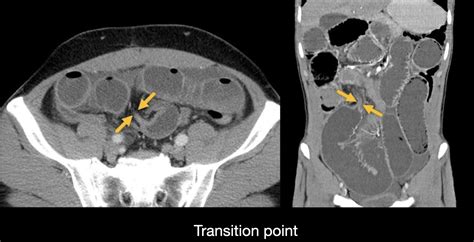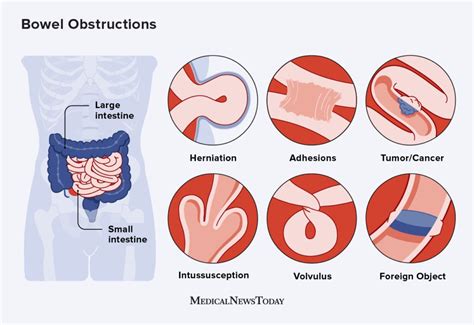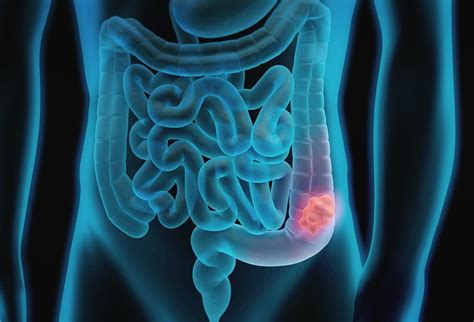Intro
Identify Small Intestine Blockage Symptoms, including bowel obstruction, intestinal ischemia, and abdominal pain, to seek prompt medical attention for proper diagnosis and treatment of this serious condition.
The small intestine is a vital part of the digestive system, responsible for absorbing nutrients from the food we eat. However, a blockage in the small intestine can lead to severe complications and even life-threatening conditions if left untreated. It is essential to recognize the symptoms of a small intestine blockage to seek medical attention promptly. A blockage in the small intestine can be caused by various factors, including adhesions, hernias, tumors, and foreign bodies. Understanding the causes and symptoms of a small intestine blockage can help individuals take preventive measures and seek medical help when needed.
The symptoms of a small intestine blockage can vary depending on the location and severity of the blockage. Some common symptoms include severe abdominal pain, nausea, vomiting, and constipation. In some cases, individuals may experience diarrhea or bloody stools. It is crucial to seek medical attention if these symptoms persist or worsen over time. A small intestine blockage can lead to dehydration, electrolyte imbalances, and even organ failure if left untreated. Recognizing the symptoms and seeking medical help promptly can significantly improve treatment outcomes.
A small intestine blockage can be diagnosed using various imaging tests, including X-rays, CT scans, and MRI scans. These tests can help identify the location and severity of the blockage, as well as any underlying causes. In some cases, a small intestine blockage may require surgical intervention to remove the blockage and restore normal bowel function. Understanding the diagnosis and treatment options for a small intestine blockage can help individuals make informed decisions about their care.
Causes of Small Intestine Blockage

Adhesions
Adhesions are bands of fibrous tissue that can form between the small intestine and other organs or structures in the abdominal cavity. These adhesions can cause the small intestine to become kinked or twisted, leading to a blockage. Adhesions are a common cause of small intestine blockage, particularly in individuals who have undergone abdominal surgery.Hernias
A hernia occurs when a portion of the small intestine protrudes through a weakened area in the abdominal wall. Hernias can cause the small intestine to become trapped, leading to a blockage. Hernias are a common cause of small intestine blockage, particularly in individuals who have a family history of hernias.Symptoms of Small Intestine Blockage

These symptoms can be severe and debilitating, and it is essential to seek medical attention promptly if they persist or worsen over time. A small intestine blockage can lead to dehydration, electrolyte imbalances, and even organ failure if left untreated.
Diagnosis of Small Intestine Blockage
A small intestine blockage can be diagnosed using various imaging tests, including X-rays, CT scans, and MRI scans. These tests can help identify the location and severity of the blockage, as well as any underlying causes. In some cases, a small intestine blockage may require surgical intervention to remove the blockage and restore normal bowel function.Treatment Options for Small Intestine Blockage

Surgical Intervention
Surgical intervention may be necessary to remove the blockage and restore normal bowel function. This can involve a laparotomy, which is a surgical incision into the abdominal cavity. In some cases, a small intestine blockage may require a bowel resection, which involves removing the blocked portion of the small intestine.Medication
Medication may be used to manage symptoms and prevent complications. This can include pain medication to manage abdominal pain, as well as medication to prevent dehydration and electrolyte imbalances.Prevention of Small Intestine Blockage

By taking these steps, individuals can reduce their risk of developing a small intestine blockage and improve their overall health and well-being.
Lifestyle Changes
Lifestyle changes can play an essential role in preventing a small intestine blockage. This can include eating a healthy diet, staying hydrated, and avoiding heavy lifting and strenuous activity.Medical Interventions
Medical interventions may be necessary to prevent a small intestine blockage. This can include medication to manage underlying medical conditions, as well as surgical intervention to remove any blockages or adhesions.What are the symptoms of a small intestine blockage?
+The symptoms of a small intestine blockage can include severe abdominal pain, nausea, vomiting, constipation, diarrhea, and bloody stools.
How is a small intestine blockage diagnosed?
+A small intestine blockage can be diagnosed using various imaging tests, including X-rays, CT scans, and MRI scans.
What are the treatment options for a small intestine blockage?
+The treatment options for a small intestine blockage depend on the location and severity of the blockage, as well as any underlying causes. This can include surgical intervention, medication, or a combination of both.
Can a small intestine blockage be prevented?
+Yes, a small intestine blockage can be prevented by eating a healthy diet, staying hydrated, avoiding heavy lifting and strenuous activity, and managing underlying medical conditions.
What are the complications of a small intestine blockage?
+The complications of a small intestine blockage can include dehydration, electrolyte imbalances, and even organ failure if left untreated.
In conclusion, a small intestine blockage is a serious medical condition that requires prompt attention. Recognizing the symptoms, understanding the causes, and seeking medical help when needed can significantly improve treatment outcomes. By taking preventive measures, such as eating a healthy diet and managing underlying medical conditions, individuals can reduce their risk of developing a small intestine blockage. We invite you to share your thoughts and experiences with small intestine blockage in the comments section below. If you found this article helpful, please share it with others who may benefit from this information. Together, we can raise awareness about this important health topic and promote better health outcomes for everyone.
